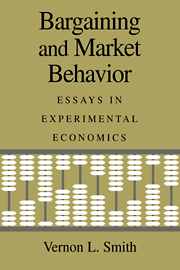Book contents
- Frontmatter
- Contents
- Preface
- Part I Economics and Psychology
- INTRODUCTION
- 1 Rational Choice: The Contrast Between Economics and Psychology
- 2 Experimental Tests of the Endowment Effect
- 3 Monetary Rewards and Decision Cost in Experimental Economics
- 4 Fairness: Effect on Temporary and Equilibrium Prices in Posted-Offer Markets
- Part II Bargaining Theory, Behavior, and Evolutionary Psychology
- Part III Institutions and Markets
- Part IV Stock Markets and Bubbles in the Laboratory
- References
- Index
1 - Rational Choice: The Contrast Between Economics and Psychology
Published online by Cambridge University Press: 29 October 2009
- Frontmatter
- Contents
- Preface
- Part I Economics and Psychology
- INTRODUCTION
- 1 Rational Choice: The Contrast Between Economics and Psychology
- 2 Experimental Tests of the Endowment Effect
- 3 Monetary Rewards and Decision Cost in Experimental Economics
- 4 Fairness: Effect on Temporary and Equilibrium Prices in Posted-Offer Markets
- Part II Bargaining Theory, Behavior, and Evolutionary Psychology
- Part III Institutions and Markets
- Part IV Stock Markets and Bubbles in the Laboratory
- References
- Index
Summary
Rational Choice (Hogarth and Reder, 1987) is about economics and psychology, or, as noted by Zeckhauser (1987, pp. 251–4), the rationalist versus behavioralist views of economics. One would have hoped that in this book, given the potential of psychologists and economists to learn from each other, the record would have shown more tangible evidence of this learning.
This chapter discusses the themes in this debate, a debate that is never quite joined: The psychologist's provocative claims are neither answered nor echoed by the economists. My comments will arise from the perspective of experimental economics, which reflects equally the rational and behavioral intellectual traditions. Generally, I want to address the reference to “a growing body of evidence – mainly of an experimental nature – that has documented systematic departures from the dictates of rational economic behavior” (Hogarth and Reder, 1987, p. vii).This suggests a contest between economic theory and the falsifying evidence from psychology. But there is a third view, that of experimental economics, which documents a growing body of evidence that is consistent with the implications of rational models, although there are many important exceptions. In the latter, often the data can be comprehended by modifying the original models. The result is to deepen the concept of rationality and simultaneously increase consistency between the observations and the models; better normative models more accurately predict the experimental results. Psychologists almost uniformly report results contrary to rational theory, which leads them to conclude that the “normative and descriptive analyses of choice should be viewed as separate enterprises” (Tversky and Kahneman, 1987, p. 91).
- Type
- Chapter
- Information
- Bargaining and Market BehaviorEssays in Experimental Economics, pp. 7 - 24Publisher: Cambridge University PressPrint publication year: 2000
- 7
- Cited by



